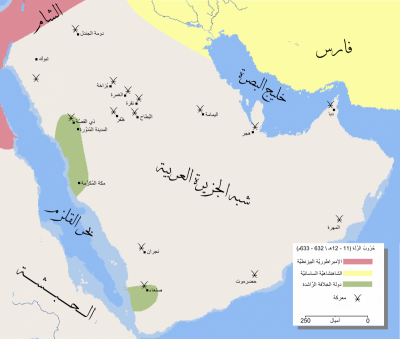The Arabian Peninsula (; Arabic: , shibhu l-jazrati l-arabiyyah, "Arabian Peninsula" or , jazratu l-arab, "Island of the Arabs") or simply Arabia is a peninsula of Western Asia, situated northeast of Africa on the Arabian Plate. At 3,237,500 km2 (1,250,000 sq mi), the Arabian Peninsula is the largest peninsula in the world.Geographically, the Arabian Peninsula includes Kuwait, Oman, Qatar, Saudi Arabia, the United Arab Emirates (UAE), and Yemen, as well as the southern portions of Iraq and Jordan. The largest of these is Saudi Arabia.The Arabian Peninsula formed as a result of the rifting of the Red Sea between 56 and 23 million years ago, and is bordered by the Red Sea to the west and southwest, the Persian Gulf and the Gulf of Oman to the northeast, the Levant and Mesopotamia to the north and the Arabian Sea and the Indian Ocean to the southeast. The peninsula plays a critical geopolitical role in the Arab world and globally due to its vast reserves of oil and natural gas.
Before the modern era, the region was divided into primarily four distinct regions: the Central Plateau (Najd or Al-Yamama), South Arabia, Al-Bahrain (Eastern Arabia or Al-Hassa), and the Hejaz (Tihamah for the western coast), as described by Ibn al-Faqih.
The Ridda Wars (Arabic: حُرُوب ٱلرِّدَّة, lit. 'Apostasy Wars' or 'Rebellion Wars'), were a series of military campaigns launched by the first caliph Abu Bakr against rebellious Arabian tribes. They began shortly after the death of the Islamic prophet Muhammad in 632 and concluded the next year, with all battles won by the Rashidun Caliphate. These wars secured the caliphate's control over Arabia and restored its nascent prestige.
During Muhammad's lifetime, many Arab rebels declared themselves prophets. After Muhammad died in June 632, Abu Bakr was elected as the caliph of the Muslim community at Saqifah. The next day, he launched a successful expedition into the Byzantine Syria. Meanwhile in Arabia, the self-proclaimed prophets started to cause mischief and arranged rebellions against Abu Bakr. The first attack on the caliphate was done by Tulayha, who prepared an army in an attempt to capture Medina, the capital of the caliphate. This was a major failure as Tulayha's forces were crushed in Zhuqissa. In the battle, Tulayha retreated and then again attacked the Muslims at Abraq and Buzakha, both were unsuccessful attempts. After the defeat, Tulayha became a Muslim, though this was not enough to stop the rise of more self-proclaimed prophets.
In September 632, Banu Azd's chief Laqit prepared an army to attack Oman. However, the commander Hudayfa's forces defeated Laqit and his army. The next month, attacks were faced in Northern Arabia and Yemen, though they were easily defeated. Few months later, Banu Hanifa's chief Musaylimah, with an army 40,000 soldiers, killed a large amount of Muslims in the Battle of Yamama, many of them being hafiz. The last major attack was done by the powerful tribe of Kinda in Hadhramaut in January 633. The campaigns came to end in June 633 as Abu Bakr successfully united all tribes of Arabia.
The Rashidun Caliphate secured it's control as all of the rebels tribes were defeated. These military campaigns are regarded by historians as Abu Bakr's greatest political and military triumph. These wars also cemented Khalid ibn al-Walid's reputation as one of the greatest tacticians and cavalry commanders in history. A detailed reconstruction of the events is complicated by the frequently contradictory and tendentious accounts found in primary sources.

 English
English  español
español  français
français  português
português  русский
русский  العربية
العربية  简体中文
简体中文 
